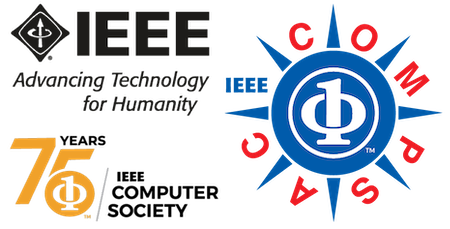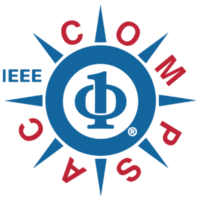The 1st IEEE International Workshop on Software Engineering for Industrial Cyber-Physical Systems (SE4ICPS 2021)
Call for Papers
Cyber-Physical Systems (CPS) and Internet of Things (IoT) represent vital drivers for large and small industries’ innovation capacity by generating sustainable growth. IoT/CPS are new generation of systems combining intensive connectivity, embedded computing, and local intelligence to create a link between physical and digital worlds and enable cooperation among systems. From a Software Engineering (SE) point of view, CPS are made up of software components located in sensing, communication, processing and storage, and actuation layers. The IoT/CPS characteristics require various levels of software components smart distribution and collaboration. This is in line with the COMPSAC special theme: Intelligent and Resilient Computing for a Collaborative World. Within adopting IoT/CPS in industries, several companies face the challenge of integrating those software components to build efficient architectures that can be used across different products and various applications. SE4ICPS workshop aims to bring together academics and practitioners to document and share the advances made within industrial projects on IoT/CPS. The workshop covers all areas of IoT/CPS that address real-world applications, application designs, industrial case studies and user experiences of CPS technologies. The SE4ICPS’s target audience are industrial and scientific communities, governmental entities, and broad public.
The importance of IoT/CPS is increasing with massive digitization, opening new market opportunities, and bringing new challenges to maintain, strengthen, and extend the enabling technologies. The barriers to master CPS are still high due to scientific and technological challenges and industrial and organizational issues. Indeed, the level of interaction required between the different procurement chain players to design, validate, produce, and qualify Cyber-Physical Systems is so high that no industrial sector has yet acquired it on this date.
The workshop’s attention goes to the specific pillar of software engineering in industrial IoT/CPS. The IoT/CPS characteristics may require various levels of software distribution and collaboration. In the industrial IoT/CPS, the projects’ nature requires coordination in all sensing,processing, and actuating layers. Some companies design their IoT/CPS by focusing on collaboration at the sensor level. With sensory collaboration,the information can be shared with various processing elements deployed on sensors, at the network edge, or in the cloud. Some companies need anIoT/CPS with collaboration at the processing elements level to attune all processing components towards unified goals. Collaborating at theprocessing elements level might require a distributed algorithm that satisfies the IoT/CPS’s global objective. Some companies focus on thecollaboration of actuators. Such coordinated actuation, supported by processing elements, must be performant and resilient in both hardware and software levels.
Considering the variety of industrial projects dealing with SE in IoT/CPS, it is often necessary to consider the support of real-time functionalities. Another focus is self-adaptation, which equips software systems with capabilities to cope with environmental and contextual changes occurring in real-time. Self-adaptation techniques can also guarantee the dynamic nature of collaborative systems. Software architectures can be designed to engineer self-adaptive systems. An architecture model provides a global view of the system and its properties and behavior.
Architectural adaptation includes an architectural model of the controllable software components that allows the feedback loop to reason about various system configurations and adapt it based on goals. The SE4ICPS workshop deals with a wide range of software challenges, including the concept mentioned above. We specially investigate fundamental software notions and challenges related to the field of IoT/CPS.
The objective of SE4ICPS is to create synergies between SMEs, large companies, and large research organizations operating in the IoT/CPS sector. A strategy will be carefully crafted to raise awareness of the novel scientific and research results and target commercial enterprises.
The SE4ICPS will aim at attracting industries to share, for instance, their:
- IoT/CPS software deployment
- Scenarios, use cases, and architectures for the trials conducted in CPS oriented SE companies
- Developments and results of the SE tested scenarios
- IoT/CPS software technologies explored and developed
We also target attracting academic communities which are involved in the practical side of IoT and CPS, to share, for instance, their:
- Empirical studies on SE fro IoT/CPS within the collaborations with companies
- Open challenges in software development with access to the industry datasets
- Novel software architectures applicable in industrial projects
- Challenges in validating the novel CPS approaches and models developed by computer society researchers
The workshop covers all SE areas of IoT/CPS that address real-world applications, application designs, industrial case studies and user experiences of CPS technologies. All submissions are expected to provide some evidence of their effectiveness in realistic scenarios. The submission of purely theoretical or speculative papers is discouraged. The use of simulation validation which use industrial dataset could beacceptable as well. In short papers, conceptual papers and survey studies, the lack of evaluation is accepted. Experience reports about the use or adaptation of known systems and techniques in real-world applications are equally welcome.
Topics of interest include, but are not limited to:
- Software architectures for industrial IoT/CPS
- Real-time sensing, processing, and actuation software for industrial IoT/CPS
- Communication and infotainment systems in IoT/CPS
- Sensor networks for IoT/CPS
- Self-adaptive software and adaptive control in industrial IoT/CPS
- Middleware design for industrial IoT/CPS
- Software design theory for IoT/CPS
- Formal Methods for IoT/CPS
- Safety-critical cyber-physical software systems
- Software quality attributes of IoT/CPS
- IoT/CPS-based emergency management systems
- SE for smart cities, smart homes, and smart infrastructures
- Mobile and static sensors coverage in IoT/CPS
- Design and performance optimization in cyber-physical and IoT software systems
- Fault-tolerant IoT/CPS
- Collaborative software design methods for IoT/CPS
- Testing ,validation, verification, simulation and visualization of IoT/CPS
- IoT/CPS engineering Methods and Tools
- Smart Manufacturing, Robotics
- Humans and software system interaction in industrial IoT/CPS
SE4ICPS seeks the following types of papers: original technical papers, industry papers, position papers, practical case studies, surveys andsystematic reviews, or work in progress.
All submitted papers will undergo a rigorous peer-review process, conducted by at least 3 experienced reviewers. Papers will be selected based on originality, quality, soundness, and relevance. All contributions must be original, not published, accepted, or submitted for publication elsewhere.
Important Dates
Workshop papers due: 21 April 1 May 2021 (UPDATED)
Workshop paper notifications: 15 May 2021
Camera-ready and registration due: 31 May 2021
Authors are invited to submit original, unpublished research work, as well as industrial practice reports. Simultaneous submission to other publication venues is not permitted. In accordance with IEEE policy, submitted manuscripts will be checked for plagiarism. Instances of alleged misconduct will be handled according to the IEEE Publication Services and Product Board Operations Manual.
Please note that in order to ensure the fairness of the review process, COMPSAC follows the double-blind review procedure. Therefore we kindly ask authors to remove their names, affiliations and contacts from the header of their papers in the review version. Please also redact all references to authors’ names, affiliations or prior works from the paper when submitting papers for review. Once accepted, authors can then include their names, affiliations and contacts in the camera-ready revision of the paper, and put the references to their prior works back.
Formatting
Workshop papers are limited to 6 pages. Page limits are inclusive of tables, figures, appendices, and references. Workshop papers can add an additional 2 pages with additional page charges ($250USD/page).
Paper Templates
IEEE Paper templates are available in MS Word 2003 and LaTex. All submissions must use US 8.5×11 letter page format.
Note: If the submission link does not appear on EasyChair after logging-in, please click the above button again.
Workshop Organizers
Eric Rutten, INRIA Grenoble Alpes, France
Email: eric.rutten@inria.fr
Mahyar T. Moghaddam INRIA Grenoble Alpes, France
Email: mahyar.tourchi-moghaddam@inria.fr
Guillaume Giraud, RTE, France
Email: guillaume-np.giraud@rte-france.com
Program Committee
Mahyar Tourchi Moghaddam, INRIA Grenoble Alpes, France
Eric Rutten, INRIA Grenoble Alpes, France
Guillaume Giraud, RTE Paris, France
Luis Almeida, University of Porto, Portugal
Jesper Andersson, Linnaeus University, Sweden
Karl-Erik Arzen, Lund University, Sweden
Paul Bogdan, University of Southern California, US
Sergiy Bogomolov, Newcastle University, UK
Alessandro Biondi, Scuola Superiore Sant’Anna of Pisa, Italy
Jan Bosch, Chalmers University of Technology, Sweden
Frank Buschmann, Siemens AG, Germany
Radu Calinescu, University of York, UK
Thierry Coupaye, Orange Labs, France
Paul Davidsson, Malmo University, Sweden
Aleksander Fabijan, Microsoft, US
Antonio Fileri, Imperial College London, UK
Terje Gjøsæter, University of Agder, Norway
Heiko Koziolek, ABB Corporate Research, Germany
Vinay Kulkarni, Tata Consultancy Services Research, India
Henry Muccini, University of L’Aquila, Italy
Elisa Yumi Nakgawa, University of São Paulo, Brazil
Nicolo’ Rebella, Leonardo S.p.A (Italy)
Marjan Sirjani, Malardalen University; Reykjavik University, Iceland
Christopher Stewart, The Ohio State University, US
Francois Terrier, CEA, LIST, France
Hiroyuki Tomiyama, Ritsumeikan University, Japan
Claire Vishik, Intel Corporation, UK

